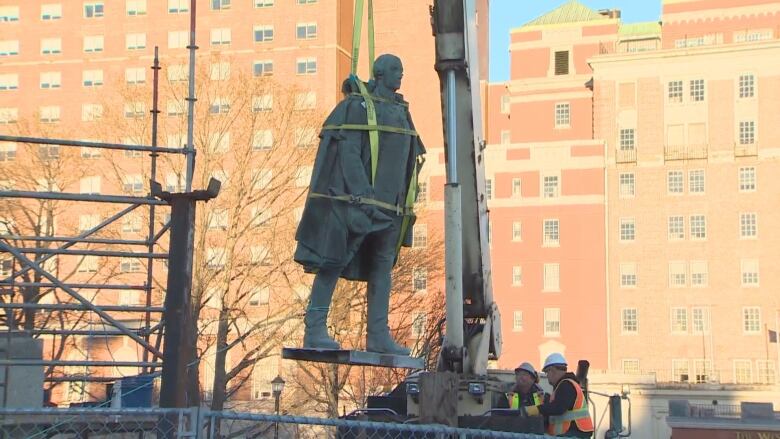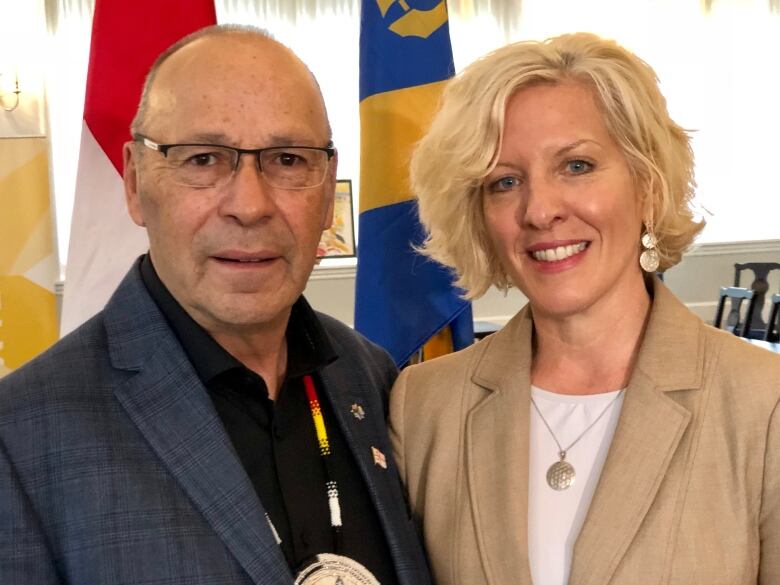Halifax sets stage for 'groundbreaking' review of Cornwallis commemorations
10-member group includes 5 Indigenous representatives

Halifax city hall has unveiled the special committee that will study how to commemorate the city's controversial founder a group co-chaired by a Mi'kmaq chief and an historian.
The 10-member group announced Thursday includes five Indigenous representatives.
Halifax council voted last fall to establish the committee, which will provide advice on what to do with commemorations of British military officer Edward Cornwallis, as well as make recommendations for honouring Indigenous history.
In 1749, Cornwallis was governor of Nova Scotia when he issued a reward for Mi'kmaq scalps, prompting calls centuries later for his name to be removed from schools, rivers, streets, parks and monuments.
A statue of Edward Cornwallis was removed from a downtown park last winter, at least temporarily.
Committee members
The committee will be co-chaired by We'koqma'q Chief Roderick Googoo, and Monica MacDonald, manager of research at the Canadian Museum of Immigration.
The other committee members are:
- Daniel Paul,social justice advocate,author, journalist, consultant, and volunteer.
- Bernie Francis, Mi'kmaw linguist and consultant.
- Pam Glode-Desrochers, executive director of the Mi'kmaw Native Friendship Centre.
- Jaime Battiste,Mi'kmaw writer, researcher, advocate and activist.
- Sheila Fougere,former Halifax municipalcouncillor.
- John Reid,professor of history.
- AJB (John) Johnston,historian, novelistand museum writer.
- Paul Friesen,Anglican priest, rector St. Paul's Church in Halifax.
"TheMi'kmaqhave been here since time immemorial and it is important that our history is also recognized and told,"Googoosaid in a statement released by the regional municipality. "This process will start the dialogue on how we tell our stories, together."

MacDonaldcalled it "a groundbreaking committee and collaboration" that will lead the way for other Canadian jurisdictions.
The Halifax Military Heritage Preservation Society, though, noted Thursday the committee does not include an expert in military history from colonial times.
A 'challenging task'
It said the committee has a "challenging task," and members who have previously expressed opinions onCornwalliswill need to ensure their contributions will be "transparent, inclusive, holistic, just and fair."
"In reviewing the list of 10 members and in light of the significant role of the military in the history and defence of Halifax and the province since the1700s, it is unfortunate council did not seek a member with expertise in military colonial history," Chris Marriott, chair of the society, said in a release.
The society said it had urged the need for "extensive public engagement" when it met with municipal staff on the issue.
Infamous proclamation
On Oct. 2, 1749,Cornwallisand his military council approved an infamous proclamation to "take or destroy the savages." The decree promised a reward of "ten Guineas for every Indian Micmac taken, or killed, to be paid upon producing such savage taken or his scalp."
Deputy MayorWayeMason said it took some time to get the committee up and running, but he's optimistic about what's to come.
"The work they have ahead of them will be difficult, but I have no doubt they are up for the challenge," Mason said in a statement.












_(720p).jpg)


 OFFICIAL HD MUSIC VIDEO.jpg)
.jpg)



























































































